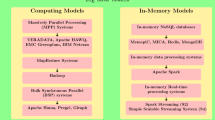Abstract
The linked data cloud provides a large collection of interlinked data and is supposed to be seen as one, big data source. However, when developing applications against this data source, it becomes apparent that different challenges arise in the various steps of programming. Among these are the selection and conceptualization of data as well as the process of actually accessing the data. The schema enhanced programming for linked data (SEPAL) project provides a new approach for integrating linked data sources when developing semantic web applications. It does this by crawling the LOD cloud, analyzing the extracted data and providing this information to a developer during development through a framework that extends the programing language. In this paper, we will motivate the necessity for a project like SEPAL and explain the core components of the project.




Similar content being viewed by others
References
Ding L, Finin T, Joshi A, Pan R, Cost RS, Peng Y, Reddivari P, Vishal D, Sachs J (2004) Swoogle: a search and metadata engine for the semantic web. In: Proceedings of the thirteenth international conference on information and knowledge management. ACM, pp 652–659
Gottron T, Scherp A, Krayer B, Peters A (2013) Lodatio: using a schema-level index to support users infinding relevant sources of linked data. In: Proceedings of the seventh international conference on knowledge capture. ACM, pp 105–108
Schwarte A, Haase P, Hose K, Schenkel R, Schmidt M (2011) FedX: optimization techniques for federated query processing on linked data. In: Proceedings of the 10th international semantic web conference, vol 7031. Springer, New York, pp 601–616
Görlitz Olaf O, Staab S (2011) SPLENDID: SPARQL endpoint federation exploiting VOID descriptions. In: Proceedings of the second international workshop on consuming linked data (COLD’11), Bonn
Buil-Aranda C, Hogan A, Umbrich J, Vandenbusshe P-Y (2013) Sparql web-querying infrastructure: ready for action? In: Proceedings of the 12th international semantic web conference, Sydney
Intizar AM, Mileo A (2014) How good is your SPARQL endpoint. In: On the move to meaningful internet systems, OTM’14. Springer, New York, pp 491–508
Scheglmann S, Gröner G, Staab S, Lämmel R (2013) Incompleteness-aware programming with RDF data. In: 2013 workshop on data driven functional programming (DDFP), Rome, pp 11–14
Wang X, Vitvar T, Kerrigan M, Toma I (2006) A QoS-aware selection model for semantic web services. In: Proceedings of the 4th international conference on service oriented computing (ICSOC). Springer, New York, pp 390–401
Oren E, Delbru R, Gerke S, Haller A, Decker S (2007) Activerdf: object-oriented semantic web programming. In: WWW’07. ACM, pp pp 817–824
Parreiras FS, Saathoff C, Walter T, Franz T, Staab S (2009) A gogo: automatic generation of ontology APIs. In: ICSC’09. IEEE Press, Piscataway
Kalyanpur A, Pastor DJ, Battle S, Padget JA (2004) Automatic mapping of OWL ontologies into Java. In: SEKE’04
Scheglmann S, Scherp A, Staab S (2012) Declarative representation of programming access to ontologies. In: ESWC’12. LNCS, vol 7295. Springer, New York, pp 659–673
Leinberger M, Scheglmann S, Lämmel R, Staab S, Thimm M, Viegas E (2014) Semantic web application development with LITEQ. In: Proceedings of the 13th international semantic web conference, Riva del Garda
Konrath M, Gottron T, Staab S, Scherp A (2012) SchemEX—efficient construction of a data catalogue by stream-based indexing of linked data. J Web Semant 16:52–58 (Elsevier)
Author information
Authors and Affiliations
Corresponding author
Rights and permissions
About this article
Cite this article
Scheglmann, S., Leinberger, M., Gottron, T. et al. SEPAL: Schema Enhanced Programming for Linked Data. Künstl Intell 30, 189–192 (2016). https://doi.org/10.1007/s13218-015-0418-4
Published:
Issue Date:
DOI: https://doi.org/10.1007/s13218-015-0418-4




